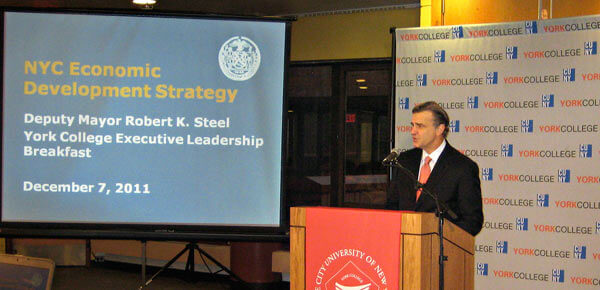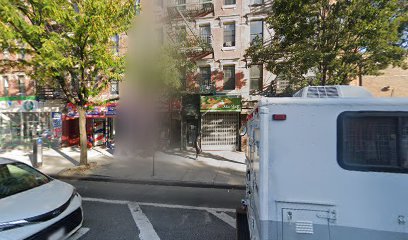By Ivan Pereira
The deputy mayor in charge of trying to boost the city’s economy told York College’s student body and faculty last week that the only way for New York to recover its economic strength would be an investment in education and tapping into the potential of future employers.
Robert K. Steel, deputy mayor for economic development, spoke candidly during the college’s executive leadership breakfast Dec. 7 about the plans to revitalize the economy and create new jobs.
Steel said the recent Labor Department report that U.S. unemployment has slightly decreased to 8.6 percent is misleading because not only is it higher among inner-city minorities, but also a large number of people are spending more than a year without a job.
“I think we have to raise our right hand and take an oath that [says] there is something better,” he said.
Steel said the mayor and his various offices, including the Economic Development Corp., have come up with a four-point plan to improve conditions in the five boroughs.
The first is a stronger, dedicated effort to improving the quality of life. Steel said the reduction of crime, an increase in green initiatives and improvement in schools will encourage more people and businesses to move to New York.
The deputy mayor said the second initiative calls for a streamlining of the way businesses are created and evolve. Restaurants that start up in the city have to apply for dozens of permits and licenses before they can serve their first meal, according to Steel.
“Our perspective is to make an accelerated effort to make things faster,” he said.
Southeast Queens plays a major role in the city’s third initiative, the deputy mayor said. New investments in infrastructure, affordable housing and transportation not only keep the city flowing, but also expand commerce from outside Manhattan.
Steel noted that the Moda apartment development, which added hundreds of apartments at the old Queens Family Court building on Parsons Boulevard, and AirTrain to John F. Kennedy International Airport have been great successes for the city and there was more to come for the borough, including the Hunters Point development project. Once the Long Island City mixed-use high-rise goes up, it will not only offer more affordable housing, but will generate positive buzz for the borough.
“It will be pretty darn exciting for people in Manhattan to see what is going on in western Queens,” he said.
Steel said the most ambitious part of the plan to rev up the economy is the mayor’s request for proposals for a new engineering campus in the city. He acknowledged that New York is lagging behind other cities like Boston, which have numerous high-tech college programs and benefit from students’ skills once they graduate.
“One of the things we don’t have are strong, high-quality engineering and applied science programs,” he said.
The RFP, which has drawn several applicants from around the world — including Stanford, New York and Columbia universities — calls for a large campus in Brooklyn or on Roosevelt Island or Governors Island.
Students questioned the plan, asking why the city did not invest in CUNY and build upon its current schools. Last week the CUNY board increased yearly tuition by $300 annually for the next five years despite a major protest by students and instructors.
Steel reminded the audience that some of the schools vying to establish the new center are New York institutions and the outside campuses have pledged to work closely with the city for the project.
“Some of the schools that are from outside New York are partnering with our local schools,” he said.
Reach reporter Ivan Pereira by e-mail at ipereira@cnglocal.com or by phone at 718-260-4546.































